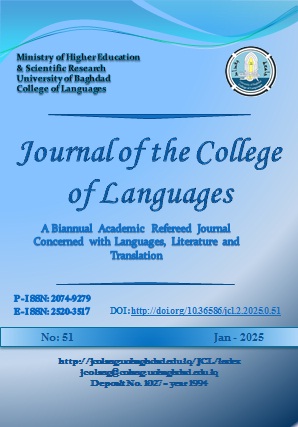تحول الشعارات والقوالب النمطية خلال تغييرات الاتجاهات السياسية
Трансформация лозунгов и стереотипов при смене политического курса
DOI:
https://doi.org/10.36586/jcl.2.2025.0.51.0209الكلمات المفتاحية:
صناعة الاساطير السياسية، الاطار البلاغي، تحليل الخطاب، التحليل المقارنالملخص
تستعرض هذه الدراسة التحولات التي طرأت على الشعارات السياسية، والعبارات الرائجة، والقوالب النمطية في روسيا والعراق خلال فترات تغيير الأنظمة السياسية في أواخر القرن العشرين وأوائل القرن الحادي والعشرين. الهدف الرئيسي من العمل هو التحديد والتحليل المقارن للتغيرات اللغوية والثقافية التي رافقت التحولات السياسية في كلا البلدين.
تشمل منهجية البحث تحليل محتوى النصوص السياسية، والتحليل المقارن للتحولات اللغوية، وتحليل البيانات الإحصائية. الفرضية الرئيسية هي أنه على الرغم من وجود اتجاهات شائعة في التغيرات اللغوية والثقافية بسبب العمليات العالمية للديمقراطية والعولمة، إلا أن الأشكال والديناميكيات المحددة لهذه التغيرات تختلف بشكل ملحوظ تبعًا للسياق الوطني.
تظهر نتائج الدراسة أن كلا البلدين شهدا عمليات إزالة الأيديولوجية من المفردات الاجتماعية والسياسية، وتحرير الخطاب العام، وتعدد وجهات النظر. ومع ذلك، تم الكشف عن اختلافات كبيرة، لا سيما في طبيعة سياسة اللغة ودور الدين في الخطاب العام. وتسهم الدراسة في فهم آليات التفاعل بين اللغة والثقافة والسياسة في ظل التحولات الاجتماعية الجذرية، ويمكن استخدامها للتنبؤ بالعواقب الاجتماعية والثقافية للتغيرات السياسية.
المراجع
Saddam Hussein, Former President of Iraq (1979-2003). (July 2024). Retrieved from lenta.ru: https://lenta.ru/lib/14159682/full.htm
Al-Ali, Z. (2014). Competing narratives and the Iraq War: Debating the British involvement. Middle East Critique, 23(2), 203-218.
Al-Marashi, I. (2018). The geopolitical context of the Iran-Iraq War, 1967-1988. Edinburgh University Press.
Bengio, O. (2012). The Kurdish Spring. The National Interest, 117, 8-17.
Bonnell, V. (1999). The iconography of the worker in Soviet political art. In S. White & P. Kenez (Eds.), Political culture and civil society in Russia and the Soviet Union. Palgrave Macmillan.
Bottici, C., & Challans, T. (2006). Rethinking political myth: The clash of civilizations as a self-fulfilling prophecy. Retrieved from https://doi.org/10.1177/1368431006065715
Britannica, T. E. (n.d.). Iran-Iraq War. Retrieved from https://www.britannica.com/event/Iran-Iraq-War
Dixon, J. (2017). Discourse, dictatorship and deception: Controlling the story in post-Soviet Russia. ECPR Press.
Entman, R. (1993). Framing: Toward clarification of a fractured paradigm. Journal of Communication, 43(4), 51-58.
Fairclough, N. (1989). Language and power. London: Longman.
Gudkov, L. (2004). Negative identity: Statuses, attitudes and values among the Russian people in the aftermath of the reforms of the 1990s. Russian Social Science Review, 45(3), 3-26.
Ihsan, B. (2015). Comprehending demonization in Iraq: Saddam Hussein and political myth-making. Totalitarian Movements and Political Religions, 16(1), XX-XX.
Ingram, H. J. (2020). The ISIS reader: Milestone texts of the Islamic State movement. Oxford University Press.
Janks, H. (1997). Discourse, power, and resistance: A critical discourse analysis of students' talk about language. Language and Education, 11(3), 161-184.
Kotkin, S. (1995). Magnetic mountain: Stalinism as a civilization. University of California Press.
Kuzio, T. (2022). Dark duality: Revolution and counterrevolution in Ukraine. Routledge.
Laruelle, M. (2009). In the name of the nation: Nationalism and politics in contemporary Russia. Palgrave Macmillan.
Mendelson, S. E. (2005). Searching for a post-Cold War foreign policy legitimacy. The Washington Quarterly, 28(2), 107-130.
Mohammed, M. (2019). News article. Reuters.
Riordan, J. (2007). Propaganda and nation-building in the Soviet Union. In R. T. Mattson (Ed.), Soviet and post-Soviet politics. Edwin Mellen Press.
Samer. (2010). Iraqi laws. Retrieved from https://wiki.dorar-aliraq.net/iraqilaws/law/6720.html
Scherr, A. (2017). The Russian dialectic: Moscow conceptualists reckon with Soviet postmodernity. De Gruyter.
Tarrow, S. G. (2010). The strategy of paired comparison: Toward a theory of practice. Comparative Political Studies, 43(2), 230-259.
Tsygankov, A. P. (2021). The dark double.
Warrick, J. (2022). Black flags: The rise of ISIS. Random House.
White, S. (1990). Gorbachev in power. Cambridge University Press.
Aron, R. (2003). Democracy and totalitarianism. Moscow: Nauka.
Bushev, A. B. (2004). Historical analysis of Pentagon public relations in covering the military operation in Iraq. In Actual problems of communication theory. Saint Petersburg: SPbSPU Publishing.
Gerasimov, O. (2004). Iraqi oil. Moscow: INFRA.
Dydko, S. N. (2003). Russia in the socialist era: Educational and lecture course for secondary school students and university students. Moscow: Prosveshchenie.
Matuzov, N. I., & Malko, A. V. (1997). Political and legal regimes: Topical aspects. Social Sciences and Modernity, 1.
Chudínov, A. P. (2006). Political linguistics. Moscow: Flinta.
Sztompka, P. (1996). Sociology of social change. Moscow: Aspect Press.
التنزيلات
منشور
إصدار
القسم
الرخصة
الحقوق الفكرية (c) 2025 مجلة كلية اللغات

هذا العمل مرخص بموجب Creative Commons Attribution 4.0 International License.








